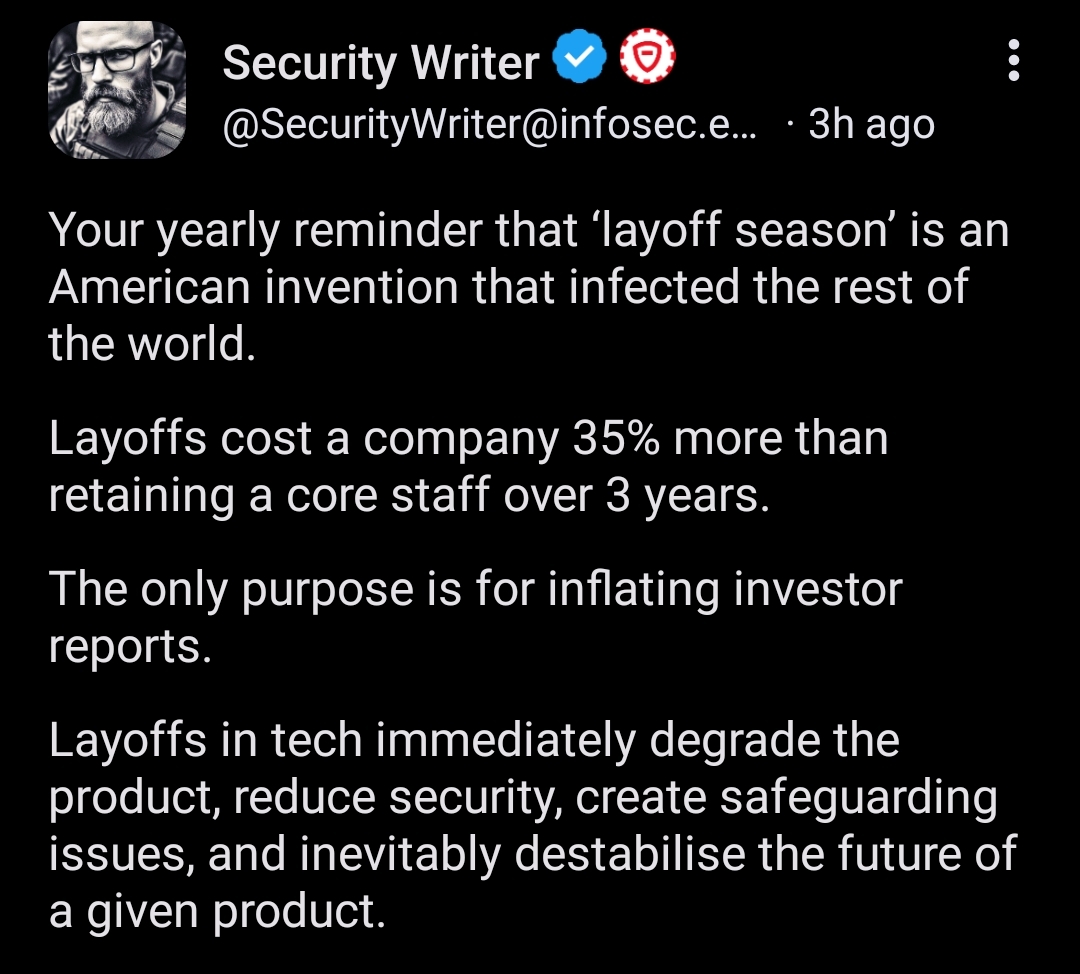this post was submitted on 14 Jan 2024
1096 points (98.7% liked)
People Twitter
5445 readers
1894 users here now
People tweeting stuff. We allow tweets from anyone.
RULES:
- Mark NSFW content.
- No doxxing people.
- Must be a pic of the tweet or similar. No direct links to the tweet.
- No bullying or international politcs
- Be excellent to each other.
- Provide an archived link to the tweet (or similar) being shown if it's a major figure or a politician.
founded 2 years ago
MODERATORS
you are viewing a single comment's thread
view the rest of the comments
view the rest of the comments

https://www.npr.org/2022/06/01/1101505691/short-term-profits-and-long-term-consequences-did-jack-welch-break-capitalism
The CEO that managed to take GE from being the single most valuable technology company and turn it into a poorly performing stagnant mess popularized the idea of survival of the fittest within companies. He asserted that by cutting the bottom performers and even whole divisions regularly that it would leave a stronger, better company. He set targets to lay off the bottom 10% every year regardless of whether it was financially necessary.
In the short term, this strategy makes efficiency metrics look really good, and with good looking metrics, the stock goes up temporarily. However, there are major costs to layoffs that take months, years, and decades to materialize. Eventually, forced churn ruins the best of companies, from GE to IBM. Unfortunately, this management style is still incredibly popular amongst publicly traded companies. Most of the investors are willing to accept the eventual demise of a company if it means a decade of really good returns in the meantime.
In addition to what you said, laying off the bottom 10% performers gives your employees a conflict of interest. Now it's better for them if their coworkers perform worse, and worse performing coworkers hurts the company. This may crop up in workers not helping each other out, or deliberately writing bad documentation.
It's absolutely insane how big and important a company GE used to be compared to how trash they are now. Same with IBM, HP, Xerox, all those old tech companies. They didn't fall to pieces because the new generation were just better, they were killed from within.
GE, for example, built a bunch of our early nuclear reactors.
They weren't just great at technology, they were great to work for. My father worked for IBM in the 80's and again in the 2000's after they acquired the company he was working for. He said it was like two entirely different companies. The 80's IBM cared about family, work/life balance, generous healthcare, had a pension. They were an engineering company that could solve any technical problem their customers could come up with. By the 2000's IBM had become a sales and management company. They had software to give employees the bare minimum pay and benefits tailored to their zip code. They were succesfully sued for age discrimination. They successfully convinced my father that he had absolutely maxed out on salary amd would never make any more. His raises didn't even match 3% inflation. He was laid off in the 2010's after a decade and a half of exemplary performance.
Five years later his salary had doubled and he was loving working on novel projects again. It was wild too see how the corporate gaslighting had convinced him he didn't deserve any better and was just lucky to have his job when in reality he was majorly underpaid and had very valuable and unique hardware design expertise. Getting laid off sucked but turned out to be one of the best things that could have happened to him.
My uncle worked at HP for the majority of his career and watched a very similar decline.
If the suits take over your engineering company, it's time to start asking colleagues if their company is still engineering focused. Don't stick around for the decline.
Man, i remember back when we called Google "the engineering company". Not anymore...
So a form of Enshittification